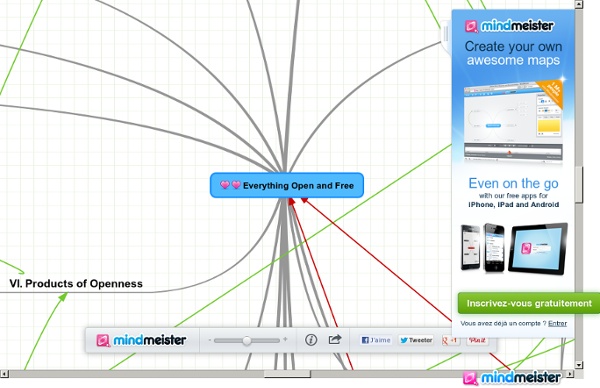



101 Fantastic Freebies - Page 13 Free. It's the magic word for an ever-expanding wealth of downloadable software and online services. Free doesn't necessarily mean good, however, and hunting for freebies can mean sifting through a lot of junk. That's where we come in. We surfed, clicked, and installed to find sparkling free gems capable of planning your time, keeping you in touch, and tuning and securing your PC, not to mention glitzing up your desktop, helping you stay productive, and entertaining you with music, videos, photos, and games. We also singled out two free offerings--one download and one online service--as the best of the bunch. Also in This Article
The Foundation for P2P Alternatives Openworld - Welcome 26 Places to Find Free Multimedia for Your Blog Nothing makes a blog post more eye-catching than a great header image, but not all publishers have artistic talent. And even accomplished digital creatives often crave some found material to start from or work with in a project. Luckily for all of the above, sources abound for finding a compelling photo to grab your readers' eyes and draw them in, or to locate fresh multimedia to remix. Creative Commons search You may be familiar with the Creative Commons free licenses that aim to give creators more freedom to allow sharing and remixing of their content. Here are several excellent spots to search large pools of Creative Commons-licensed images: 1. Free stock and public domain images Need a professional-looking image but don't have the budget for spendy stock photo houses? 5. WikiMedia Commons 12. Free audio sources Free video sources 20. Further resources 24. More blogger resources from Mashable: Image courtesy of iStockphoto, Johnnyscriv
Déclaration des Droits de l'Internaute Article 0.1 : Chaque individu est libre d'accéder ou non à Internet et de choisir les moyens d'accès qui lui conviennent. Article 0.2 : Les Internautes sont égaux en droits et en devoirs. Article 1.1 : Les données y transitent de manière égale et indifférenciée, aucune information n'a priorité sur une autre. Article 1.2 : Seul le pouvoir judiciaire peut autoriser la surveillance, l'interception ou l'interdiction d'un flux ou d'une donnée. Article 2.1 : Le droit à la communication est un droit inaliénable au titre de la liberté d'expression et du droit à l'information, qui garantissent le droit de partager le savoir, les idées et la culture. Article 2.2 : Tout individu dispose d'une protection égale de ses droits sur Internet afin que la liberté de consultation et de diffusion de contenus des uns ne porte atteinte à l'intégrité physique ou morale des autres. Article 3.1 : Le déploiement de ses infrastructures doit favoriser la communication et l'échange pour tous.
Cause commune Cause commune : l’information entre bien commun et propriété vient d’être réédité en livre numérique chez publie.net avec une préface originale. L’édition papier a paru aux Editions Fayard dans la collection Transversales (février 2005). Pour des informations sur les traductions choisissez la langue correspondante dans les menus de bas de page. Achetez le livre numérique : chez publie.net Achetez le livre papier : Achetez le chez votre libraire préféré, ou si ce n’est pas possible en ligne (Alapage, Amazon, Decitre, FNAC) … et / ou téléchargez le La version PDF du livre Cause commune : l’information entre bien commun et propriété est mise à disposition sous un contrat Creative Commons Télécharger (format PDF) Quatrième de couverture L’information et ses technologies refaçonnent notre univers technique, social et éthique, mais ces bouleversements se font dans deux directions opposées selon que l’on choisit d’en encourager l’appropriation privée ou d’en faire des biens communs. Revue de presse
Today: Winter 3D Screensaver - Experience the serene atmosphere of a quiet winter night with this outstanding Winter 3D Screensaver. It will take you away ... TheFreeSite.com offers free stuff, freebies, freeware, samples, downloads, email, games, free software, fonts, Webmaster programs, MP3s, sweepstakes, contests, coupons, catalogs